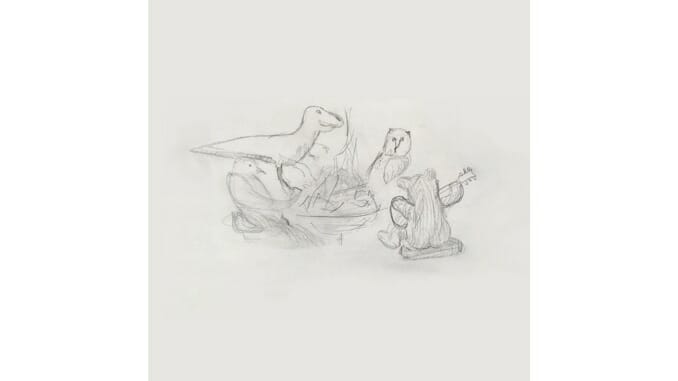Big Thief Sprawl in Every Direction at Once on Their Glorious New Double Album
Dragon New Warm Mountain I Believe in You is the work of a great band at a creative peak

In 2019, Big Thief solidified their place as reigning legends of emotionally fragile folk-rock, purveyors of music that could just as easily soundtrack a séance as a midday coffee shop. They had been making records for only three years, but that year Big Thief operated with the poise and audacity of a far more established band: releasing two stellar albums mere months apart, saying things like one album is the “earth twin” of the other, singing tributes to the homeless and voiceless with Bono-level earnestness, overwhelming a CBS This Morning studio audience with the lacerating guitar heroics of Two Hands standout track “Not.”
The band’s tour that year felt like a coronation. Audiences greeted songs that had existed in the world for mere months as though they were age-old classics. When I saw the group at Webster Hall that October, what I most remember is thinking about what a rare joy it is to see a great band performing at the absolute peak of their powers.
And what great bands often do when they realize they’re at the peak of their powers is make a double album. The first year of the pandemic allowed Big Thief the time and space to indulge this hubristic tradition. Faced with their longest break from touring since 2016’s Masterpiece came out, they wrote at a feverish pace and spent five months recording in four distinct sessions—in upstate New York, in California, in the Rocky Mountains, and in Tucson—with four different engineers. By the last session, they had generated some 45 completed songs.
The result is Dragon New Warm Mountain I Believe in You, a freewheeling creature that vibrates with the restlessness and ramshackle intimacy that have long distinguished this band, blown out to a new scale. It is an uncommonly warm and generous record, 20 songs in all—flitting from campfire folk (“Change”) to clanging cosmic rumination (“Time Escaping”) to countrified hoedown (“Spud Infinity”) in its first three tracks alone—and it solidifies Adrianne Lenker’s place as one of the greatest songwriters to emerge in the last five years.
Dragon New Warm Mountain I Believe in You is not really an indie-rock album, at least not in the way that Two Hands was. There is no successor to “Not” here, nothing that belongs on a mid-2010s indie mood board. Instead, it revels in the earthy, joyously uncool tones of a ’70s hippie-folk record excavated from a garage sale. It is Big Thief’s loosest album and most ambitious album all at once.
There is a jubilance to these performances, even a joyousness. A wailing fiddle, played by guest member Mat Davidson (aka Twain), loosens up the country stomp of “Red Moon” and the gorgeous, blue-eyed harmonies of “Dried Roses.” “Spud Infinity” is the most striking departure, an unabashedly goofy singalong, with lyrics about elbows and potato knishes that Lenker nearly rejected for their uncharacteristic irreverence, and the most conspicuous use of a Jew’s harp since Leonard Cohen jauntily deployed one in the middle of a song about 9/11. It is the kind of song that defies the band’s downbeat reputation, that stares at you with a wild glint, daring you to resist its giddy revelry.
The playfulness of these performances juxtaposes with the increasing abstraction of Lenker’s lyrics. Lenker is the kind of songwriter who exudes earnest curiosity about nature, who muses in interviews about the utter strangeness of being an organism hurling through space. She fills her songs with impressionistic images—a silver-tongued dragon (the title track), yellow stars glowing through white trees (“Blurred View”). Yet this time she also allows herself to indulge a wide-eyed simplicity. “In ‘Change,’ I felt it was just straight-up my seven-year-old self writing it,” Lenker recently told Pitchfork. The song is open-hearted and unpretentious, with spare reflections on butterflies and mortality (“Death / Like a door / To a place / We’ve never been before”) set to ambling major chords.